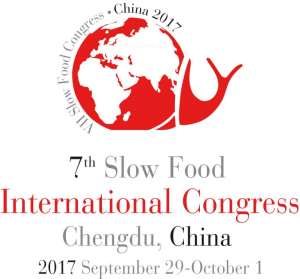
The 7th Slow Food International Congress, to be held in the Chinese city of Chengdu from September 29 to October 1 this year, will bring together a large number of delegates representing the whole world: a total of 400 food activists, hailing from 90 countries.
The International Congress, held every four years, is a key moment for the Slow Food movement, ratifying its direction in terms of policy, strategy, vision and organization at an international level, and consequently also at national, regional and local levels.
Among the central themes this year will be the challenge of climate change: agriculture and food production represent one of the main causes of climate change, but Slow Food believes they can also become one of its solutions. China is crucial to the world’s food system and can play a decisive role in tackling this global challenge.
China has to face one of the biggest agricultural dilemmas in the world: how to feed a fifth of the world’s population with only 7% of its available agricultural land. Unfortunately, in the past China has looked to solutions based on forceful industrialization and the use of chemicals, with the widespread application of pesticides and synthetic fertilizers. Given the size of the country, its population and its economy, the environmental impact of this production system has weighed heavily on the whole planet.
This is one of the reasons that Slow Food’s decision to hold its 7th International Congress in China is a strategic one, and marks an important milestone. Since 1989, when the international Slow Food association was founded, the movement has grown to become a global food organization, involving millions of people in over 160 countries and working to ensure that everyone has access to good, clean and fair food.
Since 2015, Slow Food’s network in China has been working on a number of projects aimed at saving the country’s food biodiversity and protecting the great variety of landscapes and habitats that characterize it.
“Thanks to the experience of food communities all over the world that safeguard the resilience of their local areas and seek a fair and harmonious way of life, we at Slow Food can make a modest contribution to showing possible future paths forward,†said Carlo Petrini, founder and president of Slow Food.
“This is why, in Chengdu, we must talk about the climate, biodiversity and the new economy,†he continued, “and present our noblest and most ambitious projects for finding the right solutions for the right places at the right time. Likewise, it will be necessary to rethink our role in a changing world in which we must be pioneers. Because food allows us to live and to connect with each other—it is our identity and our window on the world.â€
The Slow Food International Congress is certified as a carbon-neutral event thanks to the contribution of SouthPole Group, an international company specialized in reducing greenhouse gases and in a wide array of sustainability solutions for both public and private organizations. SouthPole Group will compensate footprints and offsets generated by the Congress, including flights, through their Huóshui Grouped Small Hydropower project.
The Slow Food International Congress has been made possible thanks to the support of the following partners: Autogrill, Colussi, Di Martino, Eataly, Lavazza and Rivetti. Legal partner: BLB Studio Legale.
Slow Food International Press Office
Slow Food is a global grassroots organization that envisions a world in which all people can access and enjoy food that is good for them, good for those who grow it and good for the planet. Slow Food involves over a million activists, chefs, experts, youth, farmers, fishers and academics in over 160 countries. Among them, a network of around 100,000 Slow Food members are linked to 1,500 local chapters worldwide, contributing through their membership fee, as well as the events and campaigns they organize. As part of the network, more than 2,400 Terra Madre food communities practice small-scale and sustainable production of quality food around the world.




 We’ll protect state wealth from opaque deals – Prof Jane Naana
We’ll protect state wealth from opaque deals – Prof Jane Naana
 Mauritania president says running for second term in June polls
Mauritania president says running for second term in June polls
 I won't ever say I was a mere driver’s mate' — Prof. Opoku-Agyemang
I won't ever say I was a mere driver’s mate' — Prof. Opoku-Agyemang
 2024 polls: 'EC struggling to defend credibility'— Prof. Opoku-Agyemang
2024 polls: 'EC struggling to defend credibility'— Prof. Opoku-Agyemang
 Akufo-Addo gov't's 'greed, unbridled arrogance, unrestrained impunity, sheer dis...
Akufo-Addo gov't's 'greed, unbridled arrogance, unrestrained impunity, sheer dis...
 Election 2024: Ghana needs an urgent reset, a leadership that is inspiring – Ma...
Election 2024: Ghana needs an urgent reset, a leadership that is inspiring – Ma...
 Partner NDC to rollout a future of limitless prospects – Prof Jane Naana Opoku-A...
Partner NDC to rollout a future of limitless prospects – Prof Jane Naana Opoku-A...
 NPP will remain in gov’t till Jesus comes — Diana Asamoah
NPP will remain in gov’t till Jesus comes — Diana Asamoah
 Sunyani Technical University demands apology from former SRC president over sex-...
Sunyani Technical University demands apology from former SRC president over sex-...
 'Dumsor' was resolved by Mahama but ‘incompetent' Akufo-Addo has destroyed the g...
'Dumsor' was resolved by Mahama but ‘incompetent' Akufo-Addo has destroyed the g...
